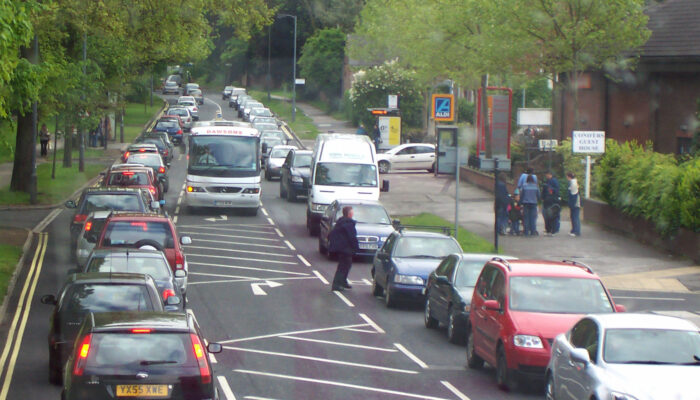
In November, an anonymous government source told the Times that Chancellor Rishi Sunak was considering national road pricing to fill a “£40 billion tax shortfall created by the switch to electric cars.” A month later, the Transport Committee of the House of Commons launched an inquiry into Zero Carbon Vehicles and Road Pricing.
We have been here before, of course. An adviser in the last Labour government, which seriously considered the idea in the mid-2000s, told me:
“In the abstract, [national road pricing] looks the perfect demand management tool and so we can all agree in the seminar room on the desirability of this, and it chugs along and then when it emerges into the light of real politics it gets shot down.”
That quote is from Roads Runways and Resistance, which tells the inside story of the most controversial transport issues in Britain since the late 1980s. Over two years I interviewed over 50 ministers, advisers, protestors and civic leaders. Two of the chapters cover the protest actions against fuel tax rises, urban congestion charging and national road pricing during the Blair years.
I never imagined when I began that I would be writing a crime or spy story, but fraud, spying and covert violence all feature at different points. I also did not imagine that I would use some of what I found in evidence to a parliamentary committee, which I have just done.
All of the seven protest movements described in the book had some impact but not necessarily in the way the protestors or the authorities imagined. During the fuel tax protests of 2000, a few hundred farmers and hauliers brought the country to a standstill. Their immediate impact on government decisions was limited: a cut of 3p a litre in fuel duty and reduced road tax for HGVs, but their long-term consequences have been far greater. Since then the tax rate on petrol, adjusted for inflation, has fallen by a third and the fall is continuing.
As fuel taxes fell off the political agenda in the early 2000s, academics and advisers turned to road pricing as an alternative method to restrain or reverse growth in traffic and congestion. Of all the plans for pricing only one – the central London congestion charge – was ultimately implemented, and powerful forces nearly derailed that one. In other cities, public and political backlashes took rational transport planners by surprise. One of the few who recognised the political realities was David Begg (Transport Times’ editor) who was Regional Transport Convenor for Lothian in the 1990s. He told me:
“I would have started by charging people to come into Edinburgh, on the basis that you’re not going to affect people who are voting in the Edinburgh election. I’d have started there and tried to win support for the concept.”
By the time Edinburgh published its abortive plans for a congestion charge in 2002, he had moved on. Meanwhile, some of my colleagues were working on a study of public attitudes to national road pricing, when a viral email went round our university, alerting people to this terrible threat and urging them to sign what became the largest ever e-petition, against it. A few months later, Tony Blair said:
“In the end it didn’t matter whether it was the right policy or the wrong policy, the public would not buy it. I wouldn’t personally as a politician engage in that type of kamikaze politics.”
So what relevance does all of that have to the situation we face today? The latest proposals for road pricing follow the announcement sales of petrol and diesel cars will end in 2030, or 2035 for hybrids. That timetable is too slow to meet the Sixth Carbon Budget now before parliament. Could national road pricing fill that gap? Several people I respect have argue that it could and should. I am not so convinced.
In the short-term, we need to reduce driving of petrol and diesel vehicles, and the number of those vehicles on the road – whether they are replaced by electric vehicles or not. The attractiveness of petrol and diesel cars must be rapidly reduced between now and 2030. Road pricing could do that, if it makes driving of petrol/diesel vehicles more expensive; but if governments decide to compensate motorists through cuts in fuel taxes, making driving cheaper on uncongested roads (with capacity for more traffic), the net result would be more driving and higher carbon emissions.
Carbon emissions, not congestion, are the biggest threat we face today. The most effective way to reduce them is higher fuel tax, and yet governments, encouraged by the media and discouraged by no one, continue to cut it. Why then, should we believe those same politicians would introduce national road pricing and resist the inevitable pressures to reduce the cost of driving on uncongested roads?
Experimental evidence has shown how even mentioning money changes people’s attitudes. It makes them less cooperative, less willing to make sacrifices for a wider good. Governments or councils never seem to learn these lessons; each backlash leaves them in disarray, with no viable plan b. We cannot risk a repeat of those U-turns in the face of a climate emergency. My main message to the Transport Committee is that we cannot rely on electrification plus road pricing to decarbonise transport fast enough. In the short-term, I would raise fuel taxes and try some urban congestion charging where the political will exists, but supplement this with many other measures, including well-designed scrappage schemes, to reduce the number of petrol and diesel vehicles as rapidly as possible. When petrol and diesel are no longer with us, then road pricing for electric vehicles may start to make more sense.
Roads Runways and Resistance from the Newbury Bypass to Extinction Rebellion is published by Pluto Press.
About the Author
This post was written by Dr Steve Melia. Steve is a Senior Lecturer in transport and planning at the University of the West of England.
